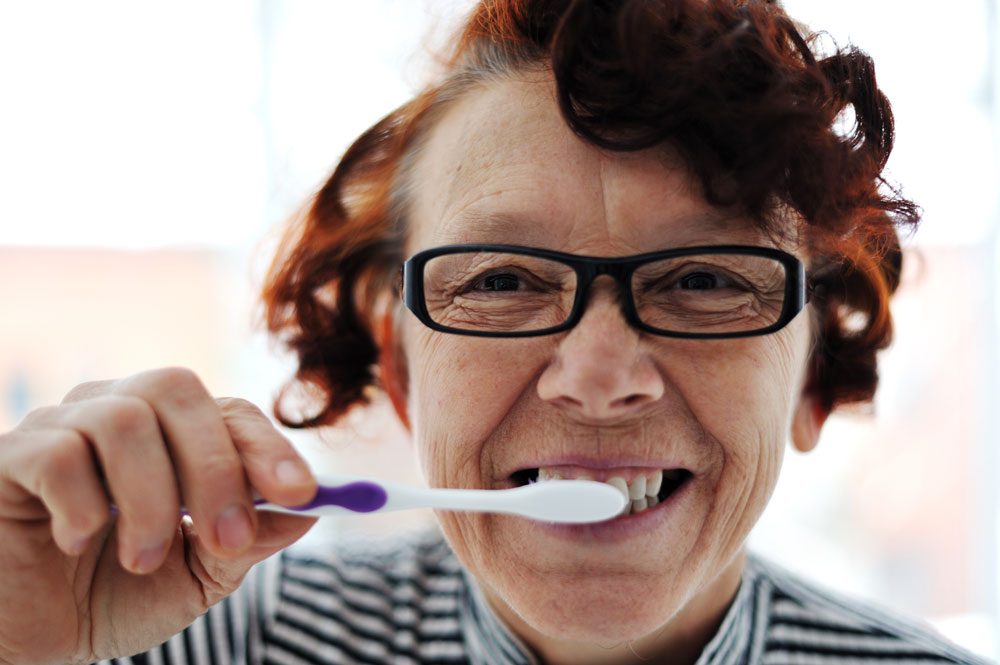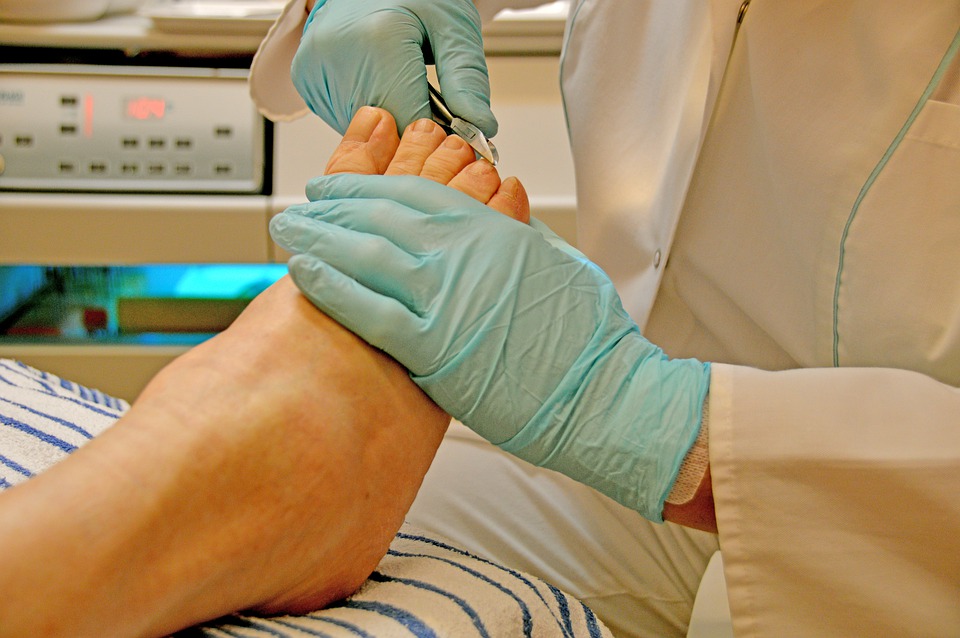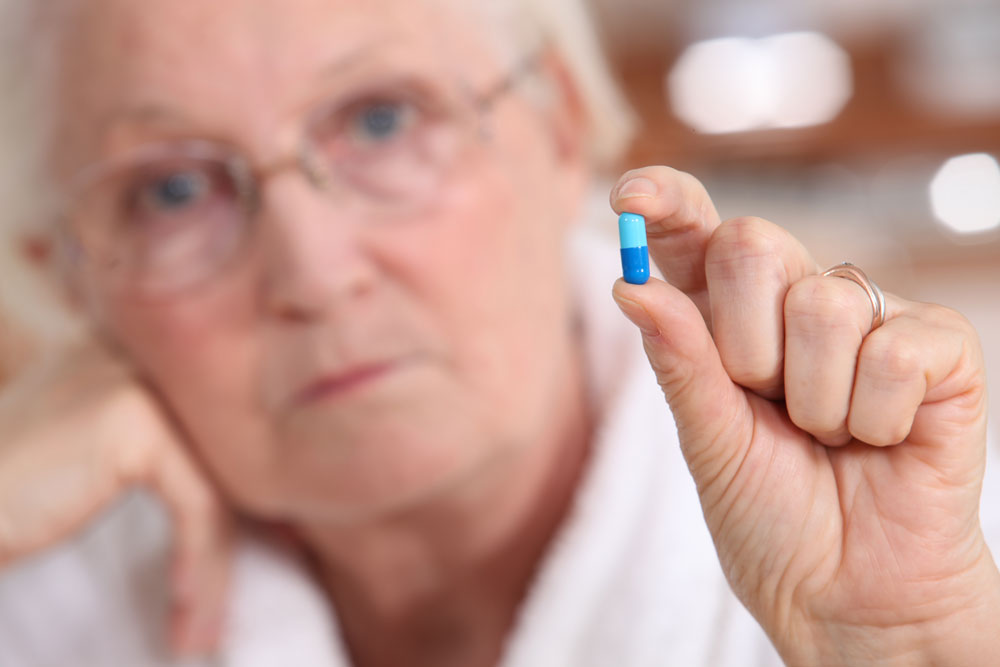Oral care - more important than many people think
This digital article based on Swedish conditions is computer translated. Hopefully we can inspire people from other countries.
A functioning basic oral care reduces the risks of poor oral health. The right aids and understanding and following the dental hygienist's advice are efforts to reduce the health risks that arise as a result of poor oral hygiene.
Poor dental health can cause pneumonia, heart disease and premature death. Pain and sores in the mouth are other consequences of poor oral health. Treatment with drugs can lead to reduced saliva production and dry mouth. Fungal infections in the mouth occur relatively often among the elderly. In the long run, it can lead to malnutrition, pressure sores and fall injuries.
 Foto: Mostphotos
Foto: MostphotosThe important role of the dental hygienist for good oral health in the nursing home
Oral care is an important part of personal care in elderly care. The dental hygienist's role in the nursing home is of the utmost importance. Good oral health not only affects the physical well-being of older people, but also has an impact on their self-esteem and quality of life. Here we will take a closer look at why oral care is so important and how dental hygienists play a crucial role in the nursing home.
A well-functioning oral care prevents ill health and contributes to well-being
Prevents disease Poor oral health is linked to several serious medical conditions, including heart disease, diabetes and lung infections. Oral care in the elderly can reduce the risk of these diseases.
Nutrition absorption Good oral health is important for the elderly to be able to eat and swallow properly. If they have pain or problems with their teeth and gums, it can affect their ability to eat and therefore their nutritional intake.
Self-esteem and social interaction A healthy mouth plays a role in self-esteem. Poor oral health as well as bad breath can make older people insecure and negatively affect their social life.
Role of the dental hygienist
Professional oral careDental hygienists have training and competence to assess and treat the oral health of the elderly. They perform regular examinations, cleanings and treatments to prevent and correct any problems.
Education and advice Dental hygienists give advice on oral care to both the elderly and the care staff. It includes instructions on brushing, flossing and choosing the right oral care products.
Dental problems are identified early Through regular checkups, dental hygienists can detect and remedy dental problems at an early stage. This prevents minor problems from becoming serious and reduces the risk of pain and discomfort for the elderly.
Customized care Dental hygienists can design individual care plans that take into account the specific needs and health conditions of the elderly. This means that oral care is tailored to each individual.
Better oral health leads to improved quality of life
By having dental hygienists on site at nursing homes, the elderly can enjoy better oral health and a higher quality of life. They can continue to enjoy their meals, feel comfortable in social settings and avoid pain and illness associated with poor oral health.
Oral care and dental hygienists are so much more than just toothbrushes and floss. They are key figures in promoting the health and well-being of elderly residents in the nursing home. Their work contributes to giving the elderly a dignified and comfortable old age.
The dental hygienist - a valuable resource at the nursing home
Many people ask for help with their oral health. Oral health assessments carried out by dental hygienists provide support to staff on how oral care should be carried out.
The oral health assessment shows whether the resident has dentures, partial dentures, own teeth or implants and how the oral care should be taken care of. Many older people have their own teeth left. To clean between the teeth, the dental hygienist often recommends the use of interdental brushes. In order to receive functional oral care, employees who know the resident's needs must be present when the dental hygienist meets the resident and performs an oral health assessment. They can then have the instructions clarified verbally.
Education and further training of the staff is important to improve the oral health of the elderly and for the elderly to receive individually designed help with their teeth. The nurse in charge has overall responsibility for the functioning of the oral care and must ensure that the staff carry out their tasks.
It can sometimes be difficult to perform oral care on people with dementia and is perceived as violating the privacy of the person who is to receive the help. If oral care becomes a natural part of care already when someone has moved in, it is easier to continue helping.
The treatment, to have eye contact to inform about what is to happen, to convey calmness in nursing is often the best way to help the person with a long-standing dementia disease. It is important to find a way to reach the resident.
Oral health assessments and dental care instructions should be available in the bathroom.
Dry mouth
Many older people suffer from dry mouth as a result of having too little saliva in the mouth or because the composition of the saliva changes. Saliva is necessary for us to chew and swallow and protects the teeth. Dry mouth often comes on stealthily and it is not even certain that the affected person notices it himself.
What is often noticed is that it can be difficult to eat or swallow. The person may have bad breath and experience that the food does not taste as it usually does. Sometimes it is noticed by the oral mucosa starting to bleed when the teeth are brushed. Difficulty sleeping and deteriorating dental health are other symptoms. For those who have dentures, it may be more difficult to use them.
Water temporarily relieves dry mouth. For some, special chewing gums or lozenges may be suitable. To protect the teeth, it is good to use fluoride chewing gum or fluoride toothpaste. There are also oral sprays such as Proxident®. All available treatments relieve symptoms but do not cure dry mouth itself.
Dry mouth can be a side effect of drug treatment, so doctors should always be informed. It may be possible to change the medication that causes the dry mouth or adjust the dose so that the symptoms are reduced. It may be helpful to consult with the resident's dental hygienist about what might be the best help. They can also measure the flow of saliva in the mouth.
Dry mouth can occur more temporarily, for example in connection with fever or dehydration from other causes such as stress. By paying attention to signals about dry mouth, we can prevent the resident from suffering.
Reflection - the dental hygienist's role in elderly care
Care staff:
• What do you do to ensure that everyone who lives with you receives good oral care?
• How do you work in the group to make oral care work?
• Do you have people living with you where it is difficult to access oral care?
• Do you have good routines for alerting if a resident becomes dry-mouthed?
• What do you do so that substitutes know who should have help with oral care and how it should be done?
• Do you document that the oral care is done?
Manager, nurse, occupational therapist and physiotherapist:
• What do you do to follow up that the oral care is working?
• Do you have routines for detecting dry mouth in your residents?
• Do you have routines where oral health is examined regularly?
• Are employees regularly offered oral care training?
• Is completed oral care documented?
• How often do you monitor the oral health of the residents?
Resident and next of kin:
• Do you/your loved one need help with oral care?
• Does the oral care seem to work as it should?
• Have you experienced dry mouth?
Erland Olsson
Head nurse
Sofrosyne
Better care every day

Aktuellt i media
- 2026-02-23 04:00 01 Kvalitet
- 2026-02-19 04:00 19 Samhället utanför
-
2026-02-16 04:00
04 Bemötande
What can you do to make your accommodation attractive to someone who is going to move in?
info Foto: Mostphotos
Foto: Mostphotos - 2026-02-09 04:00 14 Läkemedelshantering
-
2026-02-05 04:00
12 Personlig omvårdnad
"Foot Care in Elderly Care - How to Prevent Problems and Promote Health" Good foot care is fundamental for maintaining walking ability and avoiding sores.
info
- 2026-02-02 04:00 19 Samhället utanför





